College Press NIV Commentary (42 vols.)
Digital Logos Edition
Overview
Containing 42 volumes and covering every book of the Bible, The College Press NIV Commentary Collection delivers verse-by-verse explanation of the biblical text that’s as informative as it is accessible. In addition to the book introductions in each volume of commentary, this collection also includes two entire volumes dedicated to Old and New Testament introduction. This series brings together top-notch biblical scholarship and the clarity of the most popular modern translation of the Bible. The clear exposition makes this set useful for sermon preparation and Bible study and the scholarly approach makes them useful for advanced research on the text of Scripture.
The College Press NIV Commentary Series caters to a broad readership; from the ivory tower to the pulpit to the pew. The scholar will find a dedication to serious exegesis, with constant appeals to original language texts and dialogue with the interpreters of the past. The pastor will discover a wealth of potential sermon material, as the series’ verse-by-verse exposition is sensitive both to the texts’ ancient context and Christian application. And the set is throughout marked by a readability that leaves the series accessible to the average lay person looking for a Bible study aid.

- Expounds every verse in every book in the Bible
- Explains cultural and historical backgrounds to the text
- Compares the NIV translation against original Greek text (and also provides transliteration)
- Unlocks biblical passages for your theological and pastoral study
- Title: The College Press NIV Commentary Series
- Publisher: College Press
- Series: College Press NIV Commentary
- Volumes: 42
- Pages: 16,825
- Resource Type: Commentaries
- Topic: Biblical Studies
This title is included in the following collections
You can save when you purchase this product as part of a collection.
2025 Leader Gold Library
$849.99$679.992025 Charismatic Gold
$849.99$679.99Nuevo Comentario Americano del...
$927.99$927.992025 Charismatic Platinum
$1,499.99$1,199.99
- $1,499.99
- $2,999.99$2,249.99
- $2,999.99
- $2,999.99
- $2,999.99
- $2,999.99
- $2,999.99
- $4,749.99$3,562.49
- $4,749.99
- $4,749.99
- $4,749.99
- $4,749.99
- $4,749.99
- $10,999.99$8,249.99
- $11,399.99
- $23,999.99$17,999.99
- $21,749.99
- $24,999.99

This volume focuses on each individual book of the Old Testament and gives specifics on their authorship, date and purpose. The Old Testament Introduction provides an excellent starting point for any in-depth Bible book study or exegesis.
Mark Mangano served as an instructor at Cincinnati Bible Seminary from 1987 until 1990 when he joined the faculty at Minnesota Bible College as professor of Bible. He is now professor of Old Testament at Lincoln Christian University. Mangano received a BA from Minnesota Bible College, a MA from Trinity Evangelical Divinity School, and a MPhil and PhD from Hebrew Union College.

The first book of the Old Testament speaks of beginnings. It functions as the introduction to the Pentateuch and is foundational to the understanding of the rest of the Bible. Genesis explains how the people of Israel arose and were called to be God’s people. The nation to which the Pentateuch is addressed is about to enter the Promised Land. There they will face the culture and religion of the inhabitants of Canaan. The polytheistic nature religion of the Canaanites is a great temptation to Israel, and the laws recorded in the Pentateuch are designed to prevent Israel from falling into the destructive patterns of life present in Canaan.
Paul J. Kissling, PhD is professor of Old Testament and biblical languages and area chair in Bible/theology at Great Lakes Christian College, Lansing, Michigan. He is an elder at Meridian Christian Church in Okemos. Paul Kissling received the Bachelor’s degree from Great Lakes Christian College, the MDiv from Lincoln Christian Seminary, the ThM from Trinity Evangelical Divinity School, and the PhD from the University of Sheffield (England). Paul has taught and preached in over 15 countries and serves as Old Testament specialist on the Board of the Stone-Campbell Journal.
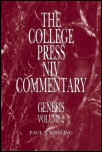
Genesis is not merely an Old Testament book. Genesis is the beginning of the Bible’s macro-narrative, the over-arching narrative which stretches from the creation in Genesis 1 and 2 to the new creation in Revelation 21 and 22. To read Genesis as Christian Scripture requires that we also read Genesis in light of its meaning for Christians who know Jesus Christ to be the ultimate seed of Abraham (Gal. 3:16).
This section of Genesis deals with the chosen family, the precursor to the nation of Israel. It focuses much more on the lives of individual characters who come to life on its pages. A predominant theme in this section of Genesis is the concept of election or “chosenness,” referring to God’s choice of particular individuals as the human channels of his blessing to the entire world. Often God’s choice runs counter to the human choice. Isaac is chosen over Lot and Ishmael; Jacob over Esau; Judah over his older brothers Reuben, Simeon and Levi. Joseph, the tenth son, is elevated above his brothers. The chosen nation descends from a series of individuals chosen for reasons other than their order of birth or expected social status. Israel is a chosen nation descended from God’s unlikely choices. The theme of God’s surprising choices binds the narratives of Genesis together and highlights at the humility that the chosen nation Israel must have toward their own election.
In this section of Genesis we have full-fledged characters such as Abraham and Sarah, Isaac and Rebekah, Jacob, Joseph, and Judah with complex narrative portrayals. The lessons we learn from them come as much from their weaknesses and mistakes as it does from their moral examples. The characters of Genesis are not white-hatted heroes riding white horses or black-hatted villains riding black ones. The message of Genesis is not simplistic moralizing.
Genesis 12–50 makes clear that even the chosen family is itself significantly sinful. This prepares the ground for the Bible’s great surprise ending. God himself, in his son Jesus the Messiah, the son of David, the son of Abraham, took on flesh and brought the answer “Yes” to all God’s promises (2 Cor. 1:20).
Paul J. Kissling, PhD is professor of Old Testament and biblical languages and area chair in Bible/theology at Great Lakes Christian College, Lansing, Michigan. He is an elder at Meridian Christian Church in Okemos. Paul Kissling received the Bachelor’s degree from Great Lakes Christian College, the MDiv from Lincoln Christian Seminary, the ThM from Trinity Evangelical Divinity School, and the PhD from the University of Sheffield (England). Paul has taught and preached in over 15 countries and serves as Old Testament specialist on the Board of the Stone-Campbell Journal.
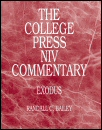
The book of Exodus functions as the sequel to Genesis describing God’s deliverance of the children of Israel and the establishment of a new covenant between God and Israel. The rest of the Old Testament looks back on the exodus of Israel from Egypt as the primary redemptive event in Israel’s history.
This primary redemptive event became central to the Hebrew Bible and the New Testament. God’s redemption of Israel became the foundation for the Israelite faith and proactive reflected in the many Old Testament allusions to the exodus as the basis for:
- Obedience to the covenant
- Proper ethical treatment of others
- The establishment of the sovereignty of God
- A national dateline marking the nation’s history
- A standard for the measurement of all subsequent events
For the Christian, Exodus serves similar functions, pointing to the important work of redemption as seen in the New Testament’s record of the death, burial, and resurrection of Jesus Christ. This perspective significantly impacts the hermeneutical foundation and message of this commentary.
The reader with a good understanding of both the Old and New Testaments sees in the exodus God’s deliverance of Israel foreshadowing the death of Christ and the establishment of the church. The Christian’s appreciation of the work of Jesus in mankind’s salvation is understood and appreciated in a ratio equal to the understanding of the messages and themes of the exodus and the book which bears its name.
Randall C. Bailey is professor of Bible at Faulkner University in Montgomery, Alabama. He received his BA, MA, GSRE, and MTh from Amridge University, and his MPhil and PhD from Drew University.
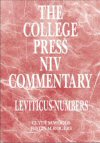
As part of the NIV based College Press Commentary series, which blends solid scholarship with practical application, this volume contains commentaries on Leviticus and Numbers. This commentary was written with the NIV Bible-reader specifically in mind. It is sure to be a helpful and reliable addition to your reference library.
The key theological concept of Leviticus is holiness. The phrase “holiness to the Lord” occurs approximately 150 times in the book. Thus, there is no doubt that the theology of Leviticus is a question of holiness. Whenever Israel is holy, they enjoy the state of purity, cleanness, and harmony with God. Whenever they are unholy, they are impure, unclean, and victims of cosmic chaos.
The Lord calls for loyalty to the new covenant just as he calls for obedience to the Mosaic legislation. The call for purity among the Lord’s people and single allegiance to his will still resonates, and Christians can learn from Leviticus to reverence the sacred space within their hearts created by the presence of their sovereign holy Lord. As priests ourselves among God’s holy spiritual house, the church, we are called upon “to be a holy priesthood, offering spiritual sacrifices acceptable to God through Jesus Christ” (1 Pet. 2:5) and even to consider our bodies “as living sacrifices, holy and pleasing to God” as our “spiritual act of worship” (Rom. 12:1). In different frame then, Leviticus can instruct us concerning human sinfulness and God’s gracious provision for atonement, healing, and hope so that we can truly be “a chosen people, a royal priesthood, a holy nation, a people belonging to God,” fit for God’s holy and sacred presence within us (1 Pet. 2:9).
Many have said that in order to preach and teach effectively from the New Testament, you must have a grasp of Leviticus.
The theme of Numbers is the wilderness experience of Israel. The trek from Sinai to Canaan that should have required but a few months at most was extended by the people’s disobedience to a period of nearly 40 years, a time that allowed the passing of one generation and the maturation of the next one.
The message of Numbers involves promise and hope but, for the most part, it is hope deferred and promise delayed. While two generations of Israelites do come into focus in the book, by any reckoning the greater stress is on the first of these, the rebellious generation that witnessed the miracles of the Exodus, received the Lord’s instruction at Sinai, and departed enthusiastically to go to Canaan, only to see their robust optimism melt in the desert heat and the other harsh realities of the wilderness.
Dr. Clyde M. Woods is professor of Bible at Freed-Hardeman University, Henderson, Tennessee where he teaches undergraduate and graduate courses in Bible and biblical languages. He holds degrees from Memphis State University, 1956; AA, Freed-Hardeman College, 1957; BA, Abliene Christian College, 1958; MA, Harding College Graduate School of Religion, 1959; MRE, MTh, Harding College Graduate School of Religion, 1961; PhD, Hebrew Union College, 1965; and Hebrew Union College, 1971. Dr. Woods has authored several books and has contributed numerous articles for print and presentation at various Christian college lectureships.
Justin M. Rogers is the author of several articles. He holds bachelors and masters degrees from Freed-Hardeman University, and is currently pursuing a PhD.
Terry Briley, PhD, is an associate professor of Bible at Lipscomb University, Nashville, Tennessee, since 1986. Terry Briley received the BA from David Lipscomb College (now Lipscomb University), then a MPhil. and PhD.from Hebrew Union College, Cincinnati, Ohio. In addition to teaching at Lipscomb University, he is the senior minister at Natchez Trace Church of Christ and leads an annual summer mission trip to Brazil.
Paul J. Kissling, PhD is professor of Old Testament and biblical languages and area chair in Bible/theology at Great Lakes Christian College, Lansing, Michigan. He is an elder at Meridian Christian Church in Okemos. Paul Kissling received the Bachelor’s degree from Great Lakes Christian College, the MDiv from Lincoln Christian Seminary, the ThM from Trinity Evangelical Divinity School, and the PhD from the University of Sheffield (England). Paul has taught and preached in over 15 countries and serves as Old Testament specialist on the Board of the Stone-Campbell Journal.

Deuteronomy has been a controversial book for at least the last 120 years. At that time what is known as the critical school developed which insisted that the book could neither have been written at the time of the exodus and wandering nor could it have been written by Moses. Hall has cogently and thoroughly defended the conservative position which holds to the traditional view which the book claims for itself. By carefully delineating the structure of the book both holistically and in many disputed passages, he demonstrates that Deuteronomy was originally a single piece of legal history, not a hodgepodge of writings from various times in Israel’s history put together by a series of editors in the years after the exile.
Gary H. Hall attended Minnesota Bible College, Eastern Christian College, and graduated from Milligan College. He earned a MDiv from Lincoln Christian Seminary with majors in Old Testament and Theology, a MTh from Gordon-Conwell Theological Seminary in New Testament, and a PhD in Old Testament from Union Theological Seminary.
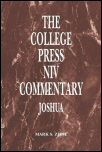
The Law of Moses asks and answers questions essential to the reading of Scripture. Some of these questions are launched upwards: Who is Yahweh? What are his expectations? Other questions are launched outwardly: Who is this Moses? What are his credentials? Yet other questions are launched inwardly: What does it mean to be the people of God? Far more than a mishmash of short stories, endless genealogies, and odd rules; torah makes specific claims about the nature of Yahweh, Moses, and the people of God. Like any living document, it must be remembered, interpreted, and applied afresh by each generation.
The book of Joshua attempts to do just this. Scripturally, it connects onto the end of the Torah, offering the story of the first generation to venture beyond the scraps of Mt. Nebo where the tracks of Moses stop abruptly, then disappear. For the exodus generation, and indeed for Moses himself, a visit to this land of promise could only be appreciated vicariously, unless, of course, one were to include a deep-down ache for a place to call home. For the Eisodos generation, on the other hand, the promise would finally become reality. To fully appreciate their position, though, the words of torah and its stories of men whose feet trod this land centuries earlier must be remembered. By the late second millennium BC, the trail of these early walkers is already old, but not yet cold; Torah retrieves the pathways of Abraham, Isaac, and Jacob. Beyond the task of remembering, the text of Joshua will also interpret torah.
Mark S. Ziese is professor of Old Testament, Cincinnati Christian University. Dr. Ziese received his BA from Ozark Christian College; MA from Cincinnati Christian University; MA from Hebrew Union College; and his PhD from Andrews University.
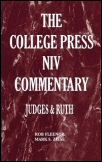
In the immediate context of the Old Testament, Judges forms a link between the exodus of the Hebrews from Egypt and the rise of the Jewish monarchy. The period reflected in Judges is crucial to the development of the Israelite psyche as God begins the lesson that the exiles to Assyria and Babylon later finish: blessing is connected to fidelity to God; suffering is the natural consequence of disobedience.
The stories in Judges are exciting, well-told tales of intrigue, suspense, seduction, violence, revenge, and triumph. Through them all, the hand of the God of Israel moves—sometimes obviously and sometimes furtively—to teach his people their need for him.
The charm, even mystique, of the book of Ruth rests in the ability of the narrative to suggest the work of God in the midst of ordinary life. Ruth is shown to be a personal example of faithfulness. She exceeds all the expectations of her society and perhaps even the letter of the law.
The message of the book of Ruth may be considered from at least two vantage points. Viewed in strictly human terms, it underlines the importance of persistent and faithful relationships in moments of crisis. Viewed from a faith perspective it communicates confidence in the ongoing work of God to fill the empty, to protect the vulnerable, and to bring joy into a grieving world. In a small way, Ruth’s story anticipates that which is only fully realized on this side of the cross.
Rob Fleenor has taught Old Testament courses at Cincinnati Christian University and has served in rural ministry in Deerfield, Missouri, and in inner-city ministry in Cincinnati, Ohio. He received a BTh and BBL from Ozark Christian College, and an MA from Cincinnati Christian University. Currently he is pursuing a PhD in biblical studies at Asbury Theological Seminary.
Mark S. Ziese is professor of Old Testament, Cincinnati Christian University. Dr. Ziese received his BA from Ozark Christian College; MA from Cincinnati Christian University; MA from Hebrew Union College; and his PhD from Andrews University.

The immediate purpose of the book of Samuel was to narrate the circumstances surrounding the founding of the monarchy in Israel with Saul, the fascinating relationships between Saul and David, and David’s rise to the throne. First Samuel narrates the expansion of the kingdom of Israel into an important power. Second Samuel deals with the covenant with David, his sin and fall from favor, and the disciplines he received for those sins.
James E. Smith received his undergraduate and seminary training at Cincinnati Bible Seminary. He received a PhD at Hebrew Union College-Jewish Institute of Religion. Dr. Smith has served congregations in Ohio and Kentucky. For 13 years he was professor of Old Testament at Cincinnati Bible Seminary. He currently serves Florida Christian College as chairman of the division of biblical studies.

1 and 2 Kings tell of David’s death, the golden age of Solomon’s reign, how the nation divided into two kingdoms, and their eventual captivity by heathen powers. Solomon, David’s son, began his rule with great wealth, glory, and power, but it ended in disgrace.
The spiritual condition of Israel was of paramount importance to the writer amidst political changes. The author of Kings holds up the history of Israel and Judah before the captives to teach them that the only way to freedom is to repent of idolatry, return to God, keep the covenant, and trust in the divine promises. He seeks to awaken in them a conviction of the truth of this teaching and to strengthen them in this conviction.
Jesse C. Long is dean of the college of biblical studies and behavioral sciences and professor of Old Testament and biblical archaeology at Lubbock Christian University. He received his BA from David Lipscomb College, his MA from Alabama Christian School of Religion, his MEd from Georgia State University, his MPhil from Drew University, his MA (Syro-Palestinian Archaeology), and his PhD (Old Testament) form Drew University.

John Mark Hicks has given us a clear vision of God’s desire for his people through the eyes of the chronicler. The message repeated again and again throughout Chronicles and this commentary is, “God seeks those who seek him; God forsakes those who forsake him.” Just as the chronicler applied the meaning of God’s promises to his own context, so Hicks challenges us to apply the meaning of these same promises to our context.
John Mark Hicks has been professor of theology at Lipscomb University in Nashville, Tennessee since 2000. Prior to his current position he most recently taught in Memphis, Tennessee, at Harding University Graduate School of Religion and Magnolia Bible College, Kosciusko, Mississippi. Hicks received his BA from Freed-Hardeman College, MAR from Westminster Theological Seminary, MA from Western Kentucky University and PhD from Westminster.

Ezra and Nehemiah are considered some of the “historical” books of the Bible, for in them we get a glimpse of life in Israel after the exile in Babylon. Schoville identifies these as the Ezra Memoirs and the Nehemiah Memoirs. It is his belief that the first-person material in these books was probably written around 400 BC, while an editor compiled these memoirs with other sources around 300 BC, after the conquest of Alexander the Great.
Keith Schoville is professor emeritus at the University of Wisconsin-Madison. Prior to his current position he was professor of Hebrew and Semitic studies at UW-Madison, 1970–1995, and instructor of Hebrew and Semitic studies at UW-Madison from 1968–1970. Dr. Schoville received his BA from Milligan College in 1956, his MA from the University of Wisconsin in 1966, and his PhD from the University of Wisconsin in 1969.

Through fasting, prayer, and confession both Esther and Daniel discover the tenacious resolve of faith, its uncompromising purity, and the security of its shelter. These are a man and woman of faith. They challenge us to follow their lead. Mangano examines these two wonderful books and provides evidence of how the Hebrew God cares for his people and ultimately his church.
Mark Mangano served as an instructor at Cincinnati Bible Seminary from 1987 until 1990 when he joined the faculty at Minnesota Bible College as professor of Bible. He is now professor of Old Testament at Lincoln Christian University. Mangano received a BA from Minnesota Bible College, a MA from Trinity Evangelical Divinity School, and a MPhil and PhD from Hebrew Union College.
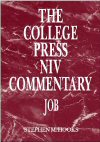
The book of Job is a “God-book” from cover to cover. God is the subject or the subject-behind-the subject of every page. Through its compelling plot and exalted speeches the book of Job explores the mystery of God’s ways to a depth and with an intensity that is unsurpassed in all of ancient religious literature.
Job has the power to engage its readers on different levels. Intellectually, it forces the reader to rethink traditional theories of divine justice by exposing the inadequacy of the simplistic, fatalistic doctrine of retribution. Emotionally, it stirs feelings of sympathy, anger, frustration, sorrow, and even laughter over its surprising plot and ironic language. Spiritually, it calls the believer to a new and higher kind of piety a piety that trusts God in spite of life’s cruel absurdities and loves God simply for who he is. It invites the reader, like Job, on a journey of faith that ends with an unexpected and life-transforming encounter with the sovereign Lord of the universe.
The book of Job stands apart from parallel literature in several ways. First, of course, is its unique theology. The monotheistic perspective of Job posed a special problem for the author’s consideration of the role of God in human suffering. No other ancient work goes as far as Job does in its search for an answer to the problem of theodicy. Its challenge to retributive justice as the sole model by which to understand how God governs his world is unapproached by any other ancient work. Second, the book of Job stands out as literature. Its characterization and employment of its protagonists, its balancing of lament and substantive debate, its blending of religious tradition and wisdom, and its powerful use of lyrical poetry are all without peer in the ancient literature. Finally, the book of Job surpasses its ancient parallels in the lasting influence it has had in human intellectual history, especially on the thinking of the Western world.
The book of Job also makes important contributions to our understanding of the faith of ancient Israel. The story of Job’s undeserved suffering and his search for the meaning of God’s role in it gives rise to a theological discussion that is as provocative as it is profound. Some of the issues explored by the book, though addressed elsewhere in the Old Testament, are discussed more fully and with greater intensity in Job than any other book of the Bible.
Stephen M. Hooks is professor of biblical studies at Atlanta Christian College. He received his PhD in Hebrew Bible and ancient Near Eastern languages and literature from Hebrew Union College. He earned his MDiv from Emmanuel School of Religion and his BA from Atlanta Christian College.
Terry Briley, PhD, is an associate professor of Bible at Lipscomb University, Nashville, Tennessee, since 1986. Terry Briley received the BA from David Lipscomb College (now Lipscomb University), then a MPhil. and PhD.from Hebrew Union College, Cincinnati, Ohio. In addition to teaching at Lipscomb University, he is the senior minister at Natchez Trace Church of Christ and leads an annual summer mission trip to Brazil.
Paul J. Kissling, PhD is professor of Old Testament and biblical languages and area chair in Bible/theology at Great Lakes Christian College, Lansing, Michigan. He is an elder at Meridian Christian Church in Okemos. Paul Kissling received the Bachelor’s degree from Great Lakes Christian College, the MDiv from Lincoln Christian Seminary, the ThM from Trinity Evangelical Divinity School, and the PhD from the University of Sheffield (England). Paul has taught and preached in over 15 countries and serves as Old Testament specialist on the Board of the Stone-Campbell Journal.

Psalms was written in poetic form, the language of the soul. This expression of emotion ranges through all the human experience from praise and joy to lament and sorrow. By some estimations, nearly one third of the Old Testament is in some form of poetry that could be converted to song. Spanning nearly 700 years, several authors contributed to the book of Psalms, including David, Moses, Asaph, and others.
S. Edward Tesh received his AB from Johnson Bible College and his MDiv from Butler School of Religion. His thesis topic was “The Emergence and the Nature of the Tetragrammaton.” Tesh studied for a brief time at the University of Manchester (England). He began teaching at Lincoln Bible Institute (now Lincoln Christian College) in 1949. Tesh was named professor of Old Testament at Lincoln Christian Seminary in 1951. He retired from active teaching in 1991, completing 42 years of faithful service to higher Christian education.
Walter D. Zorn received his undergraduate degree from Atlanta Christian College, and majored in Semitic languages and literature at Lincoln Christian Seminary where he received his MDiv. Zorn continued his post-graduate studies at Michigan State University, writing a PhD dissertation entitled, “Mark and the Samaritans.” Walter Zorn served as professor of Bible and biblical languages at Great Lakes Christian College from 1976–1988. Since 1988 he has been associated with Lincoln Christian College and Seminary, serving as academic dean (1988–1993) and is presently professor of Old Testament and biblical languages.

Psalms is a book not only to read but to meditate upon. Taking refuge in Yahweh as the true king is the answer to the renewed hopes of the people of God. Each psalm has its own “personality.” In contrast to the first volume of this series, volume two will keep the entire framework of the psalter in mind as each psalm is studied. The Psalms should never be read simply as individual psalms, neglecting the context of the whole.
Walter D. Zorn received his undergraduate degree from Atlanta Christian College, and majored in Semitic Languages and Literature at Lincoln Christian Seminary where he received his MDiv. Zorn continued his post-graduate studies at Michigan State University, writing a PhD dissertation entitled, “Mark and the Samaritans.” Walter Zorn served as professor of Bible and biblical languages at Great Lakes Christian College from 1976–1988. Since 1988 he has been associated with Lincoln Christian College and Seminary, serving as academic dean (1988–1993) and is presently professor of Old Testament and biblical languages.

Typically known as part of the wisdom literature category, Proverbs and Ecclesiastes provide insight into the process of obtaining and keeping wisdom. Interestingly enough, these books point out that pursuing wisdom on one’s own is useless because wisdom is a gift from God. Wisdom that is described in these two books is wisdom that is sought out, not in solitude, but in community with God and other human beings.
Dave L. Bland is the associate professor of homiletics at Harding University Graduate School of Religion. Prior to that he was an associate professor at Columbia Christian College, Portland, Oregon. He has served as the pulpit minister at Eastside Church of Christ, Portland, Oregon, and White Station Church of Christ, Memphis, Tennessee.

The reader of a book as large as Isaiah needs some sense of the structure of the whole in order to grasp the significance of the individual segments. A major issue for understanding both the structure and the unity of the book is the narrative section in chapters 36–39. These chapters connect the poetic portions in chapters 1–35 and 40–66. Chapters 1–35 reflect the backdrop of the Assyrian crisis and culminate in the deliverance of Jerusalem from Sennacherib through the faith of Hezekiah (chapters 36–37). Chapters 38–39 describe God’s extension of Hezekiah’s life, the arrival of Babylonian envoys to congratulate him (and promote and alliance between them), and God’s announcement of the future Babylonian exile. These events set the stage for chapters 40–66, which reflect the backdrop of the return from Babylonian exile. The fact that the events of chapters 38–39 predate those of chapters 36–37 indicates a deliberate arrangement which affirms the unity of Isaiah. This volume covers chapters 1–27.
Terry Briley is professor of Old Testament at Lipscomb University, Nashville, Tennessee, since 1986. Terry Briley received a BA from David Lipscomb College (now Lipscomb University), and a MPhil and PhD from Hebrew Union College in Cincinnati, Ohio. In addition to teaching at Lipscomb University, he is the senior minister at Natchez Trace Church of Christ and leads an annual summer mission trip to Brazil.

The New Testament quotes Isaiah more than any Old Testament book other than Psalms, but Isaiah offers much more to the Christian. The challenges the prophet Isaiah confronted in his ministry provide the backdrop for profound theological insights. During Isaiah’s lifetime the Northern Kingdom fell and the Southern Kingdom was facing the future prospect of defeat and exile as well. In his critique of the sins that would cause Judah’s fall to Babylon, Isaiah provides insights into the basic qualities God looks for in a relationship with his people. This volume covers chapters 28–66.
Terry Briley is professor of Old Testament at Lipscomb University, Nashville, Tennessee, since 1986. Terry Briley received a BA from David Lipscomb College (now Lipscomb University), and a MPhil and PhD from Hebrew Union College in Cincinnati, Ohio. In addition to teaching at Lipscomb University, he is the senior minister at Natchez Trace Church of Christ and leads an annual summer mission trip to Brazil.

Throughout the writings of Jeremiah—in Jeremiah and Lamentations—the predominant theme is God’s sovereignty. In the book of Jeremiah, we see that God retains the ability to choose his prophet, to determine the fate of the nations, and to continue to hold out both the threat of destruction and the hope of deliverance. Lamentations examines the same themes from the viewpoint of the sufferers. Jeremiah laments the inevitable destruction of his fellow Israelites while trusting in God to set right the wrongs committed against them.
Timothy M. Willis is Blanche E. Seaver Professor of Religion and chair of the religion division at Pepperdine University. He has served as a youth minister in Texas and minister of the Brookline Church of Christ, Brookline, Massachusetts. Dr. Willis received his BA (1981) and MA (1984) from Abilene Christian University, and his PhD from Harvard University in 1990.

The book of Ezekiel is notoriously strange. Ezekiel’s visions, actions, and words are bizarre “sometimes utterly incomprehensible” to us. He lies on his side for over a year, he eats a scroll, he is asked to cook with human waste, and he cannot cry at his wife’s death. Ezekiel’s message seems unavailable to many because we simply don’t have “ears to hear.”
Brandon L. Fredenburg is assistant professor of biblical studies, Lubbock Christian University, Lubbock, Texas. Formerly he served as an instructor in bible at Lipscomb University in Nashville, Tennessee and was associate minister of the Central Church of Christ in Nashville. Brandon received a BA in biblical languages from David Lipscomb College, a MA from Lipscomb University, a MDiv from Beeson Divinity School, Samford University, and is a PhD candidate in biblical interpretation from The University of Denver and The Iliff School of Theology.

Written as a type of road map for students of the Bible, Harold Shank, in his commentary on the early Minor Prophets, seeks to provide necessary information for the journey of Scripture reading. While extremely diverse in setting and literary devices, the works of the Minor Prophets can be summarized by three major themes. First, all can be categorized as prophecy. While prophecy is known to look to the future, which these books do, they are rooted in the past. The prophets books remind the nations of the God who has given them laws, who desires the laws to be kept, and who deserves his people’s respect because he has revealed himself to them through the laws. We can also see that judgment and its associated images play a major part in the writing of the prophets. The people in Joel’s day experienced some of God’s wrath in the form of a locust plague. Jonah was to preach to a city that would be completely destroyed if it did not repent. All prefigure doom for the wayward, whether experienced in the physical life or the spiritual life. Finally, the problem of syncretism is confronted: Israel’s tendency to mix the worship of Yahweh with the worship of Baal and other gods. Over and over again the prophets denounce Israel’s idolatrous ways as they call for God’s people to return wholly to him.
Hosea, Joel, Amos, Obadiah, Jonah, and Micah are all discussed in this volume.
Harold Shank is a graduate of Oklahoma Christian with a BA in Bible. He received his MA and MAR from Harding University Graduate School of Religion. His PhD in theology is from Marquette University. Dr. Shank has served as professor of Old Testament at Oklahoma Christian University and is now president of Ohio Valley University. He has served as a preacher, an author of several highly respected books, and an evangelist who has devoted much of his life’s work to developing ministries among the poor. For 32 years he was associated with the Highland Street Church of Christ in Memphis, Tennessee.
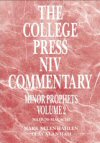
This second volume commentary on the Minor Prophets will be a helpful and reliable addition to your reference library. This volume contains the Minor Prophets from Nahum to Malachi.
The act of reading and interpreting the Bible requires contemporary readers to traverse from their world to the world of the text. However, a cultural distance between the two worlds complicates this journey. Biblical authors use images from ancient agriculture and warfare that are distant to modern readers. They refer to events, circumstances, geographical entities, and sociopolitical realities familiar to the text’s original audience, but not part of a frame of reference for contemporary readers.
Both general Bible readers and others doing in-depth biblical research should find helpful this volume for diminishing or closing the distance between the biblical audience and contemporary readers. As a result, they may better read, understand, and be challenged by the messages of the prophets.
Nahum, Habakkuk, Zephaniah, Haggai, Zechariah, and Malachi are the final six books in a 12-book collection often referred to as the Minor Prophets. This name refers to their relative brevity as opposed to their diminished significance. They circulated together with the first six books of the collection (Hosea, Joel, Amos, Obadiah, Jonah, and Micah) in an anthology known to the Jews as the Book of the Twelve, the final book in the section of the Hebrew Scripture known as the Prophets.
Clay Alan Ham has served as professor of New Testament and preaching at Dallas Christian College since 1988. He is also a visiting professor at Lakeview Bible Seminary, Chennai, India. Dr. Ham received his PhD from Southwestern Baptist Theological Seminary and his BA and MDiv from Lincoln Christian College and Seminary. He is author of The Coming King and the Rejected Shepherd: Matthew’s Reading of Zechariah’s Messianic Hope.
Mark Allen Hahlen has served as professor of Bible and language at Dallas Christian College and as a visiting professor at Louisville Bible College since 1992. Before that, he served on the faculty of Louisville Bible College from 1985 to 1992. Dr. Hahlen received his MDiv and PhD from Southern Baptist Theological Seminary and his BA from Johnson Bible College. He has held youth and preaching ministries in Tennessee, Kentucky, and Texas.
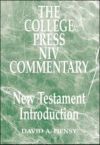
In this concise historical survey, the first introduction to the New Testament written by a member of the Stone-Campbell Movement since J.W. McGarvey’s Evidence of Christianity in 1888, Fiensy assesses the evidence for the authorship and date of each New Testament book.
What is new about this work, however, is the author’s attention to historical and cultural background information. The author introduces the reader to the historical, religious, and social life of Jesus. Fiensy then surveys the four Gospels and the beginning of the early church.
He introduces the remainder of the New Testament with a chapter on the religious and social background of the Greco-Roman world followed by chapters on the life of Paul, the Pauline letters, the General Epistles, and Revelation. This important survey ends with a chapter on the text and canon of the New Testament.
Dr. Fiensy uses the latest archaeological and textual evidence to help illumine many passages in the New Testament. Illustrations, tables, and appendixes contribute in making this book a valuable resource tool for college students and general readers alike.
David Fiensy has been a professor at Kentucky Christian University since 1995. Prior to this he served for six years as the senior Mminister at Grape Grove Church of Christ, Jamestown, Ohio. Dr. Fiensy holds an AB from Cincinnati Bible College, a MA from Xavier University, and a PhD from Duke University and was institute scholar at the Institute of Christian Origins, Tuebingen, Germany. In addition to his ministry, Dr. Fiensy also serves as adjunct instructor at Wright State University and associate editor of Journal for the Study of the Pseudepigrapha.
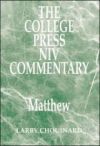
Through precise and well thought out commentary, Chouinard underscores the text of Matthew with historical insights, textual research and cultural understandings that bridge 19 centuries of time, animating the spectacular story of God coming to save his people.
Divided into five major discourses, Matthew’s Gospel seeks “common ground” between deity and humanity. This “common ground” provides the Christian with all of the tools needed to train, equip, rebuke, and exhort in all righteousness and for all occasions. Matthew is the epitome of readiness. This is the spiritual food every Christian needs to grow a healthy spiritual life with a strong focus on Christ.
Larry Chouinard received his BA and MA from Alabama School of Religion, his MTh from Harding Graduate School of Religion, and his PhD from Fuller Theological Seminary. Currently he is professor of New Testament at Kentucky Christian College.
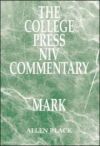
What would you give up to spend just one hour with Jesus as he walked along the Judean countryside? What would you ask him as you walked along the Sea of Galilee? Believed by some to be the first Gospel account of Jesus’ life, the Gospel of Mark captures all of the emotion and marvel of the Son of God! Written from the memoirs of the Apostle Peter by his self-proclaimed “spiritual son” John Mark, the Gospel of Mark tells the miraculous story of God’s plan to redeem all people who will call on his name. With authority and power, Mark leads us through life-changing encounters of everyday people as they were touched and made whole by Jesus; emotionally, physically, and most importantly spiritually. Your life will be changed and your soul revived as you study the Gospel of Mark through the NIV Commentary Series.
Allen Black is professor of New Testament at Harding University Graduate School of Religion. Dr. Black holds a BA in Bible and English and a MTh in New Testament from Harding University, and a PhD from Emory University.
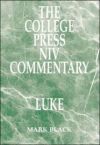
Luke and his first readers were very much like us. They were not among the first generation of believers. Yet these readers of the Gospel of Luke were educated people, having been raised of the best human thinking. Being bright and inquisitive, yet knowing the basics about Jesus and his followers, they had many questions. And Luke gave them answers.
The single goal of the present commentary is to place modern readers into the shoes of the first readers of Luke’s Gospel. The assumption behind this commentary is that we can only know what Luke means if we know what Luke meant. We are especially fortunate in this regard to be examining the Gospel of Luke, since Luke, more than any other Gospel writer, tells us what the message of Jesus meant in a later day. To give his readers this information, Luke provides a sequel—the book of Acts. The present commentary therefore looks at the Gospel of Luke from the perspective of Acts, the best commentary on Luke’s Gospel, and with a view toward the modern church.
Mark C. Black is associate professor of Bible at David Lipscomb University, Nashville, Tennessee. He is also associate minister at the Donelson Church of Christ. Mark received a BA from Freed-Hardeman University, a MA and MDiv from Harding Graduate School of religion, a ThM from Princeton Theological Seminary, and a PhD from Emory University.
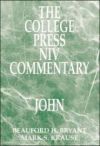
The Gospel of John is an easy read for first-time seekers and new Christians. At the same time, life-long scholars marvel at its content. Late in the Gospel, John revealed his purpose for writing. “These are written that you may believe that Jesus is the Christ, the Son of God, and that believing you may have life in his name” (John 20:31). The authors of this commentary have focused on John’s intended message for Christians in his day, and by extension, Christians today.
Beauford H. Bryant received several degrees during his college years: Johnson Bible College, BA; Phillips University, MA and BD; Princeton Theological Seminary, MTh; University of Edinburgh, PhD. He also studied at the University of Chicago, Harvard University, the University of Marburg, the University of Tubingen, and Oxford University.
Mark S. Krause was a faithful student under the leadership of Dr. Bryant. His personal relationship with Dr. Bryant made him the logical choice to finish this commentary. Dr. Krause is currently professor of biblical studies and academic dean at Puget Sound Christian College, Edmonds, Washington. He has been awarded the following degrees: Puget Sound Christian College, BA; Emmanuel School of Religion, MDiv; Trinity Evangelical Divinity School, PhD.
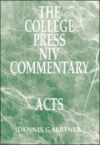
The book of Acts is pivotal not only in our understanding of the events which established the Church of Jesus Christ, but also for providing a connecting link between the four Gospels and the Epistles of the New Testament. Without this record or knowledge of how the message of Jesus Christ came to be a missionary plea to the whole world would be severely weakened.
Dennis C. Gaertner was professor of New Testament at Johnson Bible College and minister of Meadowbrook Christian Church in Johnson City, Tennessee. Dr. Gaertner holds a BRE from Great Lakes Bible College, and a ThM and PhD from Southern Baptist Theological Seminary.
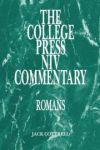
God’s word is a lamp to our feet and a light for our path (Psalm 119:105), and no part of it shines more brilliantly than the book of Romans. The truth of God’s Word sets us free (John 8:32) and Romans teaches us the most liberating of all truth. God’s Word is sharp and piercing like a sword (Hebrews 4:12), and no blade penetrates more deeply into our hearts than Romans. Martin Luther called the Epistle to the Romans “the greatest book within the greatest book.” He undoubtedly was referring to the awesome power of God revealed in Romans. This power, contained within Paul’s Epistle, has saved lives, changed hearts and altered the very course of human history. American churches have tended to concentrate on the book of Acts. Acts is a tremendous book, especially when it comes to building New Testament churches. However, Romans is to Acts what meat is to milk. As a group we need to mature; we need to move from Acts to Romans. The Apostle Paul understood the power of the Gospel of Christ. His Epistle reveals salvation on an intellectual and spiritual level not attainable by any other work or religion. It is this challenge to the intellect of men and women that produces historic change. The Epistle to the Romans is, therefore, an intellectual guide to Christianity.
Jack Cottrell is professor of theology at Cincinnati Christian Seminary, Cincinnati, Ohio. He holds an AB from Cincinnati Bible Seminary, an AB from the University of Cincinnati, a MDiv from Westminster Theological Seminary, and a PhD from Princeton Theological Seminary.
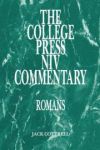
Romans, vol. 2
- Author: Jack Cottrell
- Publisher: College Press
- Publication Date: 1996
- Pages: 280
This volume on the second half of Romans addresses some of the most difficult passages within the book. The power in the Epistle to the Romans is as important today as it was in years past. If Christians today are going to evangelize the world and reverse the losses of the past century we must rediscover the power of God’s salvation exposed and explained in Romans.
Jack Cottrell is professor of theology at Cincinnati Christian Seminary, Cincinnati, Ohio. He holds an AB from Cincinnati Bible Seminary, an AB from the University of Cincinnati, a MDiv from Westminster Theological Seminary, and a PhD from Princeton Theological Seminary.
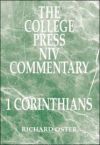
First Corinthians was written to a church rocked by division, with great cracks developing over worldly issues. The church at Corinth is a warning of what our churches today are fast becoming. The beloved church of the Corinthians had become world based, glory motivated, and grounded in immorality. But there was hope, found in a detailed plan by Paul intended to bring the Corinthian church back to repentance, unity, and most importantly back to God. We call this plan 1 Corinthians, a letter written for the sake of restoration. This makes 1 Corinthians one of the most important books we can turn for leadership, as we bring our churches back to God. It is in this letter that we find many of the basic truths that we hold today. Paul covers the sanctity of marriage, the spiritual destruction that comes with sexual immorality, issues of civil law, and the discipline of Christian brothers and sisters who refuse to put off their evil ways. Of special interest today are the sections on spiritual gifts and the chapter on the resurrection. 1 Corinthians deals with most of the issues in our churches today. It will bring to you a greater understanding of how God expects his church to be—fully devoted to him in love and unity.
Richard E. Oster received his BA from Texas Tech University, his MA from Rice University, and his PhD from Princeton Theological Seminary. He has done special studies at Princeton Theological Seminary and research at Franz J. Dolger-Institut at the University of Bonn.
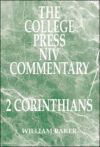
Second Corinthians plunges the modern reader back to the real, tumultuous of early Christianity. The simple ideals of sharing and goodwill described in Acts 2:42–47 seem to have little place among the diverse converts from this boomtown of Corinth where Paul chooses to anchor his Greek mission. Second Corinthians is in part a letter of joy, for a report came to Paul that the Corinthians had rejected the troublemakers and wished to rejoin themselves to him. Heart and passion rise to the surface in this letter. Not wanting to boast about himself, Paul indicates that the Corinthians themselves were his letter of recommendation. He appealed to their firsthand knowledge and experience. Paul also recounted the tribulations he endured to keep spreading the gospel.
William R. Baker graduated from Lincoln Christian College with a BA in ministry and music. He went on to earn a MA and MDiv from Trinity Evangelical Divinity School. He earned a PhD at the University of Aberdeen in Scotland. He is professor of New Testament at the Pacific Christian College of Ministry and Biblical Studies at Hope International University.
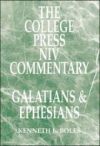
Throughout the history of the church the message of Galatians has been needed to free men from chains of false doctrine. Repeatedly men have turned away from grace to bow at the altar of law. Desperate to claim at least part of the credit for their own salvation, they have chosen to believe that they are saved by keeping enough rules, enduring enough pain, or siding with the orthodox on enough of the “issues.” Then someone will read Galatians again and the liberating message of the gospel of grace catches fire once more, and the bonds of legalism are burned away. Likewise, one of the central messages of Ephesians is that we are saved by grace through faith. We do not earn our salvation—it is the gift of God. Even though we were dead in sin and fully deserved God’s wrath, he saved us and brought us into the body of Christ. It is a glorious privilege to be a part of his body, and it carries with it a glorious responsibility. We are saved by grace, for good works. God saves us so that he could live in us and work through us. We are filled with his fullness and re-created in his likeness. We are imitators of God. His power works in us, making possible more than we could ever ask or think. We are strong in the Lord and in his mighty power. The message of Ephesians is a message of salvation.
Kenneth L. Boles is professor of New Testament and Greek at Ozark Christian College. Mr. Boles holds a BTh from Ozark Bible College and a MA in biblical and patristic Greek from Abilene Christian University. In addition to teaching classes in beginning, advanced, and third-year Greek, he also teaches exegetical courses on the Prison Epistles.
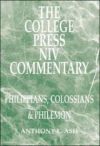
There are certain themes sounded throughout Philippians which can be an enriching pursuit by the serious student. This volume will help you explore those themes.
Personal information is generally shared in letters like Colossians. This would be especially important because there would be concern over Paul’s condition as a prisoner. But the troublesome teaching is the chief burden of the letter. Paul describes this heresy in Colossians 2:8, 16–23, and in the rest of the book he attacks it, either frontally or in more subtle ways.
Philemon is the shortest of Paul’s letters is similar to private correspondence of the day, but because of its inclusion in the New Testament and its skillful application of Christian principles, it is a very important letter for us.
Anthony L. Ash is professor of biblical studies at Abilene Christian University and minister at Minter Lane Church of Christ, Abilene, Texas. Dr. Ash holds a BS from Florida Christian College, a MA from Abilene Christian University, and a PhD from University of Southern California.
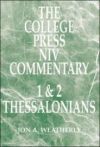
Paul met furious and violent opposition from the Jewish community at Thessalonica in his attempts to spread the Good News. With disregard for their own safety a small group from the Jewish community pledged their faith to Jesus. They were joined by gentile converts and formed the Thessalonian church. These bold converts found a special place in Paul’s heart. The letters to the Thessalonian church are among the most personal of all of Paul’s letters for this very reason. The main points revolve around personal reminiscences, commendations, counseling, exhortations, and the Second Coming of Christ. Paul strongly emphasizes the hope we have in the return of the risen Christ. Following quickly on the heels of this exhortation to be ready, are instructions on the duties involved in the Christian life. These two letters merit close examination for their application to our lives today. Upon study we learn that the Thessalonian church made several errors in their understanding of what Paul meant about the imminent return of our Lord. Even today many have claimed an exact date and time when Jesus did not return! Secondly, we must diligently look at 1 and 2 Thessalonians for the hope of the resurrection found in Jesus’ Second Coming that Paul preaches. It is this hope that will comfort us when our loved ones “go home” to be with the Lord. Thessalonians, written long ago, is for us today!
Jon A. Weatherly received his BA in Bible and Christian ministries from Cincinnati Bible College, his MA in New Testament from Cincinnati Bible Seminary, his MDiv from Trinity Evangelical Divinity School, and his PhD in New Testament from the University of Aberdeen. Dr. Weatherly has served as professor of New Testament, teaching New Testament, Greek, and hermeneutics at Cincinnati Bible College and Seminary, Cincinnati, Ohio. He currently serves as professor-at-large of general education at Lincoln Christian University.
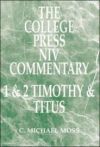
While several passages in 1 and 2 Timothy and Titus have provided the fodder for tomes of theological discussion (e.g., 1 Timothy 2:9–15 and the role of women; 1 Timothy 3:11 and deacons; 1 Timothy 3:1–8 and Titus 1:6–9 and the characteristics of those to serve as elders), the real value of these epistles lies in their message to two young ministers, to second generation believers in Ephesus and to a young church facing a pagan world in Crete. These epistles provide teaching which the church in the first needed to hear and which the church in the twenty-first century continues to need.
The two letters to Timothy and the letter to Titus stand in a very close relationship to one another. They are written to fellow workers of the Apostle Paul; they are bound together by similar content: the false teachers who bear similar situations for the churches addressed, and the same basic time-frame.
C. Michael Moss is associate professor of Bible and Greek, director of Graduate Bible Studies at David Lipscomb University, and pulpit minister at Central Church of Christ in Nashville, Tennessee. Dr. Moss holds a BA from David Lipscomb University, a MA from Harding Graduate School of Religion, and a MDiv and PhD from Southern Baptist Theological Seminary.
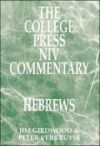
The exalted character of the Son of God is the theme and dynamic of this pivotal book of the New Testament. Jesus is the heir of all things; he is the Creator and also Reflector of God’s glory. He has the stamp of God’s nature, he upholds the universe with his power, and he is seated at the right hand of God. Do you want to understand the work of our Lord? Do you want to see how his qualities shine as the noonday sun? Do you desire to know what he is really like and the magnitude of what he has done, is doing, and what he will bring to pass? Here in the book of Hebrews, these things are clearly viewed. Jesus is both the fulfillment of the old covenant and the inaugurator of the new covenant. What the covenants mean and how they operate is fundamental to theological clarity. Hebrews is where the old and new covenants are fully discussed. Two very capable navigators will lead you through the text, pausing to point out the highlights, explaining some of the difficulties, and leading you to a deeper appreciation and understanding of who Jesus is as revealed in the book of Hebrews.
Jim Girdwood earned degrees in ministry, language, history, and Bible at Great Lakes Christian College and Cincinnati Christian Seminary. He finished his PhD at Hebrew Union College. Dr. Girdwood has taught at Great Lakes Christian College, Lincoln Christian Seminary, and Ozark Christian College. He is currently teaching at Kentucky Christian College in Grayson, KY.
Peter A. Verkruyse currently teaches at Illinois College in Jacksonville, IL. Peter received his BA in Christian ministries from Lincoln Christian College, his MA in homiletics and MDiv in New Testament from Lincoln Christian Seminary, and his MA and PhD in rhetorical theory and criticism from the University of Illinois, Urbana-Champaign.
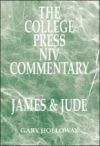
The epistles of James & Jude hold a very unique position in the New Testament Canon. The writers of these epistles are brothers of our Lord Jesus Christ! It would be difficult for us to imagine the profound effect this relationship would have on these two men. However, what it brings to their inspired writings is a direct, personal, and intimate look at the Living Word.
James and Jude hold one other unique credential that undergirds their epistles. It is likely neither brother believed in Jesus’ deity until after the Resurrection. The Apostle Paul writes it took a special and personal appearance to James to finally convince him of Jesus’ Lordship. Combined with their testimony, this translates out to very powerful proof of the Resurrection of Jesus Christ.
Gary Holloway received a BA from Freed-Hardeman College, a MAR from Harding Graduate School of Religion, a MLIS from the University of Texas, and a PhD from Emory University. Dr. Holloway is Ijams Professor of Bible and the associate director of the Center for Spiritual Renewal at Lipscomb University and preaches at the Natchez Trace Church in Nashville, Tennessee. Formerly he served as associate professor at the Institute for Christian Studies in Austin, Texas and ministered with the Holland Street Church of Christ in San Marcos.
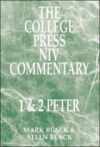
1 & 2 Peter
- Authors: Allen Black and Mark Black
- Publisher: College Press
- Publication Date: 1998
- Pages: 225
These two letters of Peter were written to first-century Christians needing clear instructions about their faith in Christ. By the leading of the Holy Spirit, these letters have remained timeless. No matter which period of church history one might want to discuss, these letters fit well. Christian character, holiness, the Day of Judgment, and the Second Coming are always important to the proper development of a Christian’s faith.
Allen Black is associate professor of New Testament at Harding University Graduate School of Religion. Dr. Black holds a BA in Bible and English and a MTh in New Testament from Harding University, and a PhD from Emory University.
Mark C. Black is associate professor of Bible at David Lipscomb University, Nashville, Tennessee. He is also associate minister at the Donelson Church of Christ. Mark received a BA from Freed-Hardeman University, a MA and MDiv from Harding Graduate School of religion, a ThM from Princeton Theological Seminary, and a PhD from Emory University.
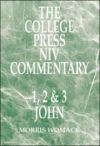
John’s presentation of the physical aspects of the resurrection is unparalleled! This study examines John’s answer to these “new” brands of Gnosticism sweeping our churches. Dr. Womack has succeeded in building a bridge from the first century to the twenty-first century, providing the tools needed to guard our hearts against these dangerous beliefs.
Morris M. Womack was professor of communication at Pepperdine University in Malibu, California. Dr. Womack held a BD in Church History and New Testament from Butler University and a PhD from Wayne State University. He served as a full-time and interim minister for several congregations.
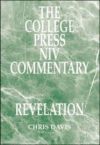
Revelation
- Author: Christopher Davis
- Publisher: College Press
- Publication Date: 2000
- Pages: 393
Christopher Davis places Revelation in its historical, cultural, and literary setting, showing how the book would have been understood by the Christians for whom it was written. He draws on Jewish, Christian, Greek, and Roman writers from biblical times in seeking to discern the meaning of the book’s vivid symbols. He thus bases his interpretation of Revelation on objective evidence, rather than on subjective speculation.
The commentary was written for the general reader of the Bible who desires to understand Revelation as John intended it to be understood. In providing a clear, nontechnical exposition of Revelation, Dr. Davis draws on his years of experience in teaching the book to teens and adults in college and church settings.
Christopher Davis is a graduate of Johnson Bible College (BA, BTh) and Union Theological Seminary in Virginia (ThM, DMin, PhD). He is vice president for academics elect and professor of biblical theology at Johnson University. He is also visiting professor of New Testament for the School of Graduate Studies of Hope International University, which is based in Fullerton, California.
Reviews
8 ratings
Randal Los
10/18/2023
this is an awesome commentary. it is very easy to understand and easy to follow. the Acts by Mark Moore is the best, and nobody can explain Romans like Jack Cottrell.
Randy
6/14/2022
It's clear and easy to understand. It distills everything down to the main points, kind of like a summary. It does offer a brief explanation about the meaning of key words from the original languages, giving both the original word and the English alliteration. If you do not already have a good overview commentary, this one seems decent for that.
Donnie
3/26/2020

Dennis Wilson
1/25/2019

robert lineberry
8/19/2018
As it had been noted: after the information explosion in the past decades, commentaries have become outdated. This recent commentary is a very good. I like the way they make sure each original word is translated the best to our English while explaining the conclusion. They make points that I miss entirely. Extensive historical data. You can tell much effort has been involved with the formation of these works. I use with the New American Commentary to compare with, then the older commentaries. User friendly.
Fred Robbins
6/29/2017
Dimitri Vandenheede
1/9/2016

Dr. Dan Baker
4/25/2015